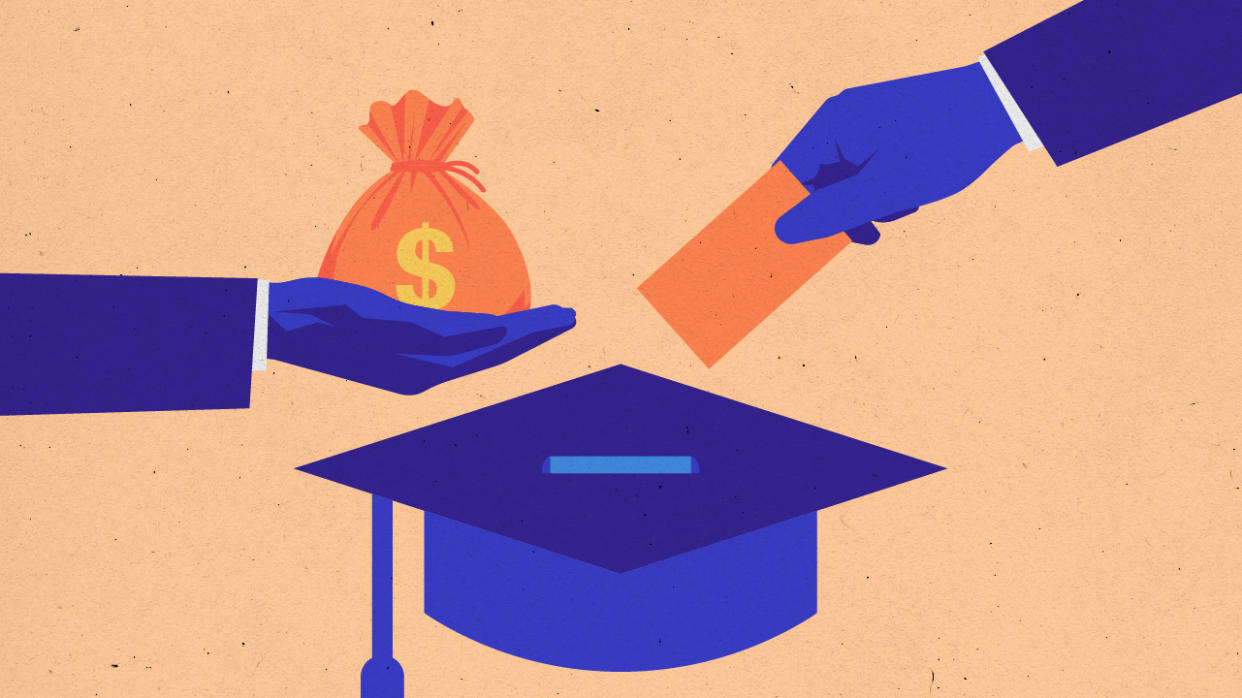4 signs you should refinance your student loans

- Oops!Something went wrong.Please try again later.
- Oops!Something went wrong.Please try again later.
In the grim, early days of the COVID-19 pandemic, the federal government threw a lifeline to the millions of Americans struggling to pay off their student debt. As part of the CARES Act signed in March 2020, lawmakers agreed to temporarily pause student loan repayments through September of that year. Presidents Donald Trump and Joe Biden extended the moratorium multiple times, and today, two years later, it remains in effect.
But for how long remains a mystery.
The pause was set to expire May 1 before Biden extended it once again, this time to Aug. 31. The White House also says there’s still a chance the president will cancel student debt altogether before then. But as it stands right now, come September, we'll all be back where we started, with whatever amount of student loan debt we had in March 2020. Our monthly student loan bills will return in full force, and just like before, we'll have to make those payments whether we like it or not.
Still, there are scenarios where it can make sense to trade your existing loans for new ones. Whether you have federal or private student loans, today's attractive rates and loan terms could lead to potential interest savings, a lower monthly payment and other benefits.
But how do you know if refinancing makes any sense? Here are four signs you should do the math to see what refinancing could do for you.
Your interest rate is more than 3%
While federal student loans offer fixed interest rates and fixed monthly payments, the rates themselves aren't always the lowest. For example, federal Direct Unsubsidized Loans would charge a fixed interest rate of 5.28% if not for the current pause. Meanwhile, private loan companies like College Ave Student Loans offer loans with fixed rates as low as 2.94% with autopay.
The interest savings can be substantial if you go from paying nearly 6% on your loans down to 3% or anything close to it. And with a lower interest rate, you can score a lower monthly payment, pay your student loans off faster or both.
For simplicity’s sake, say you owe $35,000 in student debt with an APR of 6%, a 10-year repayment timeline and a monthly payment of $388.57. Over that time, you would fork over $11,628.61 in interest payments.
If you could drop your interest rate to 3% through a refinance, you could owe just $370 per month for nine years and pay just $4,980.83 in interest payments. In addition to saving more than $6,600 in interest, you would also cut a full year from your repayment timeline.
A lower monthly payment would help with your finances
Maybe you're less interested in long-term savings and more inclined to score a lower monthly payment now. While you may wind up paying off your loans for a longer timeline if you refinance, having a more affordable monthly bill can help you in more ways than one.
Fortunately, many companies let you refinance into a new loan that lasts for up to 15 years. These longer loans can leave you paying more interest overall, but the lower monthly payment can be worth it.
You're tired of juggling multiple loan payments
Maybe you have several different loan payments to deal with, and you're sick of keeping track of them all. Along with the financial benefits of refinancing, you have the potential to consolidate several loans into a single new one.
With only one loan to manage, you can lower all of your student debt into one monthly payment.
You have good credit (or a cosigner with good credit)
Student loan refinancing is typically only an option for borrowers with good or great credit. But having a cosigner with good credit (like a parent, another family member or a close friend) can also help you get approved.
Without good credit, you're unlikely to qualify for a new loan with more favorable rates and terms.
When you shouldn't refinance your student loans
If you're seriously considering refinancing, you should also have a handle on what you would be giving up. Any time you refinance federal student loans with a private lender, you give up the chance to participate in federal student loan programs like deferment and forbearance. Refinancing with a private company also makes you ineligible for options like Public Service Loan Forgiveness (PSLF) and income-driven repayment options like Pay As You Earn (PAYE) and Income-Based Repayment (IBR).
Because of this, student loan refinancing may not be your best option. If you plan to try for student loan forgiveness or are happy with your income-driven repayment plan, you should probably just stick with the loans you have.
It’s also worth noting that the federal government may someday forgive all student loan debt. When (or if) that happens, you’ll likely be ineligible for that forgiveness if a private lender holds your student loans. So if you're still hoping for broad debt relief, it's best to hold steady with your current loan.
View the original article at Chegg Life and signup for the Chegg Life Newsletter
Related...

